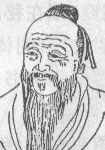次杨廉夫先辈韵
次杨廉夫先辈韵朗读次杨廉夫先辈韵。明代。袁凯。吹笛春江烟雾稀,幽芳小草总相依。巫峡宁知云雨梦,沧洲欲拭芰荷衣。花间鹳鹤迎人起,波上鱼龙挟棹飞。不似南州庾开府,乡关头白苦思归。
《次杨廉夫先辈韵》是袁凯在明代创作的一首诗词。以下是该诗的中文译文、诗意和赏析:
吹笛春江烟雾稀,
清晨吹奏笛子,春江上的烟雾渐渐散去,
This line describes the scene of a spring morning, with the mist on the river gradually dispersing. The poet sets the atmosphere and creates a sense of tranquility.
幽芳小草总相依。
幽静的芬芳小草相互依偎。
The delicate and fragrant grasses grow together in a secluded place, emphasizing their interdependence and harmony with nature.
巫峡宁知云雨梦,
巫山峡谷间的人们怎能知道云雨中的梦境,
The people in the Wushan Gorge are unaware of the dreams hidden within the clouds and rain,
This line expresses the mysterious and dreamlike nature of the Wushan Gorge, suggesting that the people there may be unaware of the wonders and illusions around them.
沧洲欲拭芰荷衣。
在沧洲,人们想要拭去湿润的芰荷衣裳。
In Cangzhou, people wish to wipe off the wet clothes adorned with water lilies.
This line suggests a desire to remove the traces of a journey or experience, symbolized by the wet clothes, and move forward.
花间鹳鹤迎人起,
在花丛中,鹳鹤起舞迎接人们,
Amidst the flowers, storks and cranes rise to greet people.
This line depicts a lively scene where birds gracefully dance among the flowers, implying a joyous and harmonious atmosphere.
波上鱼龙挟棹飞。
在波浪上,鱼和龙搏击水面,挟带着船桨飞翔。
On the waves, fish and dragons splash and soar with the oars.
This line portrays a dynamic image of fish and dragons playing in the water, symbolizing the vitality and energy of nature.
不似南州庾开府,
与南州的庾开府不同,
Unlike the Yukaifu in Nanzhou,
This line highlights the contrast between the poet's current situation and the renowned poet Yukaifu in Nanzhou. It suggests that the poet's environment lacks the same level of inspiration or support as that enjoyed by Yukaifu.
乡关头白苦思归。
在乡关的头上,我白发苦苦思念着归乡。
At the head of the hometown's pass, I, with white hair, yearn for home.
This line expresses the poet's longing for home and reflects the theme of homesickness and nostalgia.
整首诗词以自然景物为背景,通过描绘春江、花丛、波浪等元素,展现出一幅宁静、和谐、生动的自然画卷。同时,通过对巫峡和沧洲的描写,表达了人们对于未知和梦境的无知,以及对过往经历的回忆和思考。
诗词中还以庾开府为对比,凸显了诗人的寂寞和对于回归家乡的渴望,传达出离乡背井的思乡之情。
袁凯通过细致入微的描写,巧妙地将自然景物与人情思绪相融合,展示了他对自然和人生的独特感悟。整首诗抒发了对自然美的赞美和对人生命运的思考,使读者在阅读中感受到一种深邃而恬静的意境。
袁凯
袁凯,生卒年不详,字景文,号海叟,明初诗人,以《白燕》一诗负盛名,人称袁白燕。松江华亭(今上海市松江县)人,洪武三年(1370)任监察御史,后因事为朱元璋所不满,伪装疯癫,以病免职回家,终“以寿终”。著有《海叟集》4卷。...
袁凯。袁凯,生卒年不详,字景文,号海叟,明初诗人,以《白燕》一诗负盛名,人称袁白燕。松江华亭(今上海市松江县)人,洪武三年(1370)任监察御史,后因事为朱元璋所不满,伪装疯癫,以病免职回家,终“以寿终”。著有《海叟集》4卷。
猜你喜欢
送友人东归(一作方干诗,题云送卢评事东归)。唐代。戴叔伦。万里杨柳色,出关送故人。轻烟拂流水,落日照行尘。积梦江湖阔,忆家兄弟贫。裴回灞亭上,不语自伤春。
东风吹恨著眉心。金约瘦难任。西窗翦烛浑如梦,最愁处、南陌分襟。香歇绣囊,尘生罗幌,憔悴到如今。
小花幽院夜沈沈。凉月转槐阴。拂墙树动开朱户,又赢得、愁与更深。青翼不来,征鸿难倩,流怨入瑶琴。
一丛花。宋代。袁去华。东风吹恨著眉心。金约瘦难任。西窗翦烛浑如梦,最愁处、南陌分襟。香歇绣囊,尘生罗幌,憔悴到如今。小花幽院夜沈沈。凉月转槐阴。拂墙树动开朱户,又赢得、愁与更深。青翼不来,征鸿难倩,流怨入瑶琴。
观道二篇。宋代。黄庭坚。廉蔺向千载,凛凛若生者。曹李虽无恙,如沈九泉下。短长略百年,共是过隙马。事来磨其锋,意气要倾泻。风云灭须臾,草木但春夏。唯此一物灵,不可藉外假。誉髦天下才,西伯本心化。君无诮斯文,可以观大雅。
题繁杏鹦鹉图。宋代。赵佶。天产乾皋此异禽,遐陬来贡九重深。体全五色非凡质,惠吐多言更好音。飞翥似怜毛羽贵,徘徊如饱稻粱心。缃膺绀趾诚端雅,为赋新篇步武吟。
大观祭风师六首。清代。佚名。窈冥无穷,肸乡斯融。来终嘉荐,归返遥空。惟神之归,欣安导和。惟神之泽,于彼滂沱。
次韵宗伟阅番乐。宋代。范成大。十日閒愁昼掩关,起寻一笑共清欢。罢休诗社工夫淡,洗净书生气味酸。尽遣馀钱付桑落,莫随短梦到槐安。绣靴画鼓留花住,剩舞春风小契丹。
苑中遇雪应制。唐代。徐彦伯。千钟圣酒御筵披,六出祥英乱绕枝。即此神仙对琼圃,何烦辙迹向瑶池。
即觉庵子中居士来访妙峰之西既去作六言五首。宋代。释正觉。世外道人有在,庵中瓶粟无储。过客未容空去,挽衣相与分蔬。
度居庸关。明代。杨荣。居庸峻绝自天成,凤翥龙骧壮北京。猛士防边严警柝,行人驻马听泉声。云连幽蓟千峰立,地接华夷万里程。圣代车书今一统,遐方无事乐升平。
忆乔 其三。明代。方万。荒郊霾雾掩残香,惜舞怜歌总断肠。脆折锦棚呼谢豹,数声哀些咽斜阳。
送僧。宋代。释重顯。春云情既高,片段飞虚碧。去留机未消,今古望还积。澄澄天影回,杳杳地形直。别夜共相思,谁栖此泉石。
送家兄君美复之江右幕职 其五。明代。王世贞。香垆峰畔紫烟生,铁柱观头雷雨明。麻姑仙人数相过,倘到吴门好寄声。
同罗曙云过王崇芳垂云阁夜话。明代。张穆。昔共仙山饮石泉,云房璿室卧春烟。醉馀梦宿梅花月,游倦归来莲叶船。夜映丹光蒸五色,云瑶珠树隐三天。相逢为忆山中事,竹杖芒鞋又隔年。
